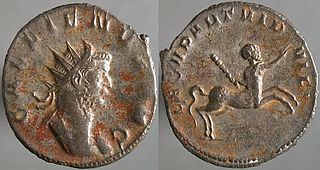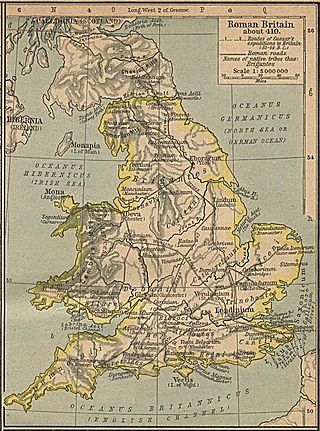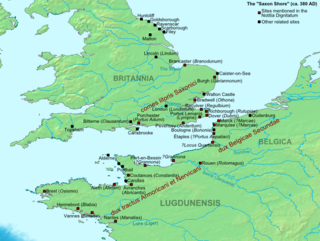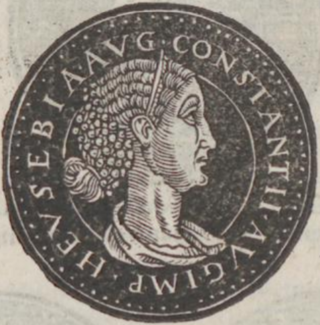Related Research Articles
Ammianus Marcellinus, occasionally anglicised as Ammian, was a Roman soldier and historian who wrote the penultimate major historical account surviving from antiquity. Written in Latin and known as the Res gestae, his work chronicled the history of Rome from the accession of the Emperor Nerva in 96 to the death of Valens at the Battle of Adrianople in 378. Only the sections covering the period 353 to 378 survive.

Constantius II was Roman emperor from 337 to 361. His reign saw constant warfare on the borders against the Sasanian Empire and Germanic peoples, while internally the Roman Empire went through repeated civil wars, court intrigues, and usurpations. His religious policies inflamed domestic conflicts that would continue after his death.

Valentinian I, sometimes called Valentinian the Great, was Roman emperor from 364 to 375. He ruled the Western half of the empire, while his brother Valens ruled the East. During his reign, he fought successfully against the Alamanni, Quadi, and Sarmatians, strengthening the border fortifications and conducting campaigns across the Rhine and Danube. His general Theodosius defeated a revolt in Africa and the Great Conspiracy, a coordinated assault on Roman Britain by Picts, Scoti, and Saxons. Valentinian founded the Valentinianic dynasty, with his sons Gratian and Valentinian II succeeding him in the western half of the empire.
Lycophron was a Hellenistic Greek tragic poet, grammarian, and commentator on comedy, to whom the poem Alexandra is attributed.

Legio II Parthica was a legion of the Imperial Roman army founded in AD 197 by the emperor Septimius Severus, for his campaign against the Parthian Empire, hence the cognomenParthica. The legion was still active in the beginning of the 5th century. The legion's symbol was a centaur.

Quintus Curtius Rufus was a Roman historian, probably of the 1st century, author of his only known and only surviving work, Historiae Alexandri Magni, "Histories of Alexander the Great", or more fully Historiarum Alexandri Magni Macedonis Libri Qui Supersunt, "All the Books That Survive of the Histories of Alexander the Great of Macedon." Much of it is missing. Apart from his name on the manuscripts, nothing else certain is known of him. This fact alone has led philologists to believe that he had another historical identity, to which, due to the accidents of time, the link has been broken. A few theories exist. They are treated with varying degrees of credibility by various authors. Meanwhile, the identity of Quintus Curtius Rufus, historian, is maintained separately.

Dux is Latin for "leader" and later for duke and its variant forms. During the Roman Republic and for the first centuries of the Roman Empire, dux could refer to anyone who commanded troops, both Roman generals and foreign leaders, but was not a formal military rank.

Hrotsvitha was a secular canoness who wrote drama and Christian poetry under the Ottonian dynasty. She was born in Bad Gandersheim to Saxon nobles and entered Gandersheim Abbey as a canoness. She is considered the first female writer from the Germanosphere, the first female historian, the first person since the Fall of the Roman Empire to write dramas in the Latin West, and the first German female poet.

Britannia Prima or Britannia I was one of the provinces of the Diocese of "the Britains" created during the Diocletian Reforms at the end of the 3rd century. It was probably created after the defeat of the usurper Allectus by Constantius Chlorus in AD 296 and was mentioned in the c. 312 Verona List of the Roman provinces. Its position and capital remain uncertain, although it was probably located closer to Rome than Britannia II. At present, most scholars place Britannia I in Wales, Cornwall, and the lands connecting them. On the basis of a recovered inscription, its capital is now usually placed at Corinium of the Dobunni (Cirencester) but some emendations of the list of bishops attending the 315 Council of Arles would place a provincial capital in Isca (Caerleon) or Deva (Chester), which were known legionary bases.

Britannia Secunda or Britannia II was one of the provinces of the Diocese of "the Britains" created during the Diocletian Reforms at the end of the 3rd century. It was probably created after the defeat of the usurper Allectus by Constantius Chlorus in AD 296 and was mentioned in the c. 312 Verona List of the Roman provinces. Its position and capital remain uncertain, although it probably lay further from Rome than Britannia I. At present, most scholars place Britannia II in Yorkshire and northern England. If so, its capital would have been Eboracum (York).

Valentia was probably one of the Roman provinces of the Diocese of "the Britains" in late Antiquity. Its position, capital, and even existence remain a matter of scholarly debate. It was not mentioned in the Verona List compiled around AD 312 and so was probably formed out of one or more of the other provinces established during the Diocletian Reforms. Some scholars propose Valentia was a new name for the entire diocese, but the List of Offices names it as a consular-rank province along with Maxima Caesariensis and the other equestrian-ranked provinces. Hypotheses for the placement of Valentia include Wales, with its capital at Deva (Chester); Cumbria south of Hadrian's Wall, with its capital at Luguvalium (Carlisle), the lands between the Antonine Wall and Hadrian's Wall, possibly with a capital at Habitancum (Risingham),, although the latter is dismissed by some modern scholars due to the absence of archaeological evidence for a Roman re-occupation of southern Scotland in the fourth century.

The Count of the Saxon Shore for Britain was the head of the Saxon Shore military command of the later Roman Empire.

The Great Conspiracy was a year-long state of war and disorder that occurred near the end of Roman Britain. The historian Ammianus Marcellinus described it as a barbarica conspiratio, which took advantage of a depleted military force in the province; many soldiers had marched with Magnentius in his unsuccessful bid to become emperor. Few returned, and supply, pay, and discipline in the following years may have been deficient.
Fullofaudes was a Dux Britanniarum, a military leader in Roman Britain in the later fourth century.
Valentinus was a Roman criminal and rebel put down after Count Theodosius's arrival in Britain in AD 369.

Agape, Chionia and Irene were sisters and Christian saints from Aquileia, martyred at Thessalonica in 304 AD. Agape and Chionia were charged with refusing to eat sacrificial offerings, whilst Irene was killed for keeping Christian books in violation of existing law. All were condemned to be burned alive.

The Saxon Shore was a military command of the Late Roman Empire, consisting of a series of fortifications on both sides of the Channel. It was established in the late 3rd century and was led by the "Count of the Saxon Shore". In the late 4th century, his functions were limited to Britain, while the fortifications in Gaul were established as separate commands. Several well-preserved Saxon Shore forts survive in east and south-east England.

Eusebia was the second wife of Roman emperor Constantius II. The main sources for the knowledge about her life are Julian's panegyric "Speech of Thanks to the Empress Eusebia", as well as several remarks by the historian Ammianus Marcellinus.

This article chronicles the attested movements of the fourth-century Roman emperors Constantine II, Constantius II, Constans, Gallus, and Julian the Apostate from 337 to 361 AD. It does not cover the imperial usurpers of the period, including Magnentius, Vetranio, Claudius Silvanus, and Poemenius. The chronology is principally derived from Timothy Barnes' Athanasius and Constantius. Substantial additions and further sources are based on recent research that seeks to go beyond Barnes' own chronology and slightly modifying his at a few places.
Dulcitius is a Latin comedy written by Hrosvitha of Gandersheim, a member of the female Abbey of Gandersheim in Lower Saxony. Written between 935–973, Dulcitius is widely believed to be her most comic work. The play treats the figure of Dulcitius, governor of Thessalonica, as a subject for a comedy in the style of Terence. Although the play is dark, with a plot that depicts the imprisonment and martyrdom of the three sisters, Agape, Chionia, and Irena, nevertheless its content is presumably deemed less grave because of the reward awaiting the Christian sufferers.
References
- ↑ JSTOR online: Studies in Philology, Vol 57, No. 4, Oct 1960, Douglas Cole, "Hrosvitha's most Comic Play: Dulcitius", op cit.
- ↑ Ammian The History, Book XXVII University of Chicago online text in translation. See end of section 8, "p.57".